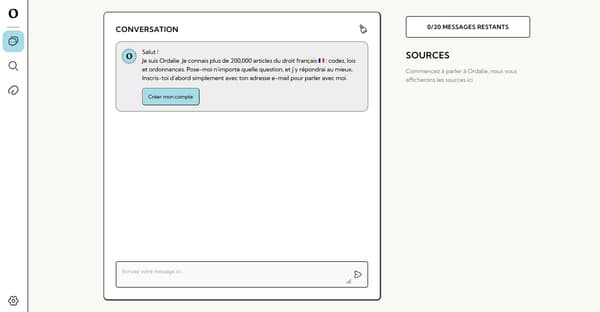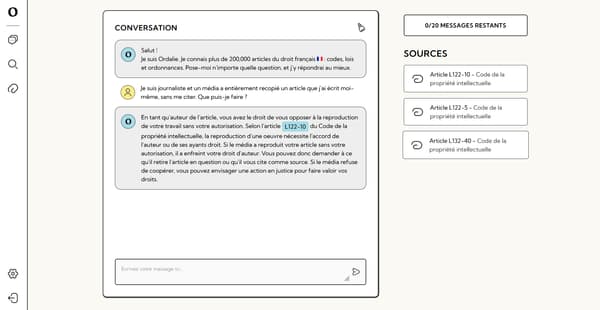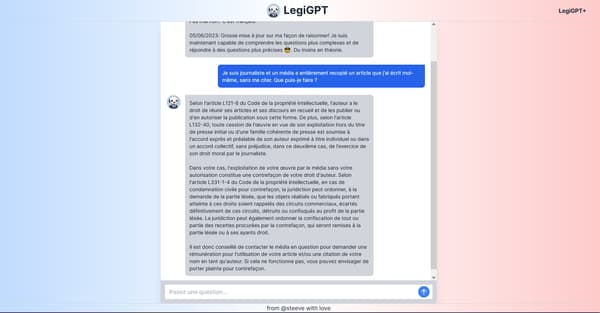Artificial intelligence is particularly suitable for answering specific legal questions. In France, two examples stood out: Ordalie and LegiGPT.
The ChatGPT chatbot continues to show its possibilities day after day. What if he could play lawyer? In France, a few entrepreneurs wanted to test his skills, each with the same goal: to make the law more accessible to everyone.
Steve Morin, a French former Google employee, used the software to create LegiGPT, a chatbot capable of answering Internet users’ legal questions. Built on the GPT-3.5 version, the robot was trained with some 148,000 French legal texts, including all the justice codes.
The tool immediately met with great success. If the conversational robot already proves striking capabilities with GPT-3.5, “it has nothing to do with the GPT-4 version” explains Steeve Morin to Tech&Co. “I showed the result to lawyers who were sincerely amazed”.

Make the law accessible
Steeve Morin insists on the relevance of LegiGPT to deal on a case-by-case basis, as close as possible to the applicant. “Language models are particularly good at processing information like laws. In fact, laws are instructions, a kind of code for humans. It applies very well to artificial intelligence” .
Same observation for Ordalie, the software created by Léa Fleury, a lawyer by training, and Baudouin Arbarétier, two entrepreneurs who have also embarked on the race. “Our initial conviction was based on the adage ‘no one is supposed to ignore the law’. Except that today, many citizens are not aware of everything: the law is disparate and sometimes unintelligible”, notes Léa Fleury .
The Ordalie co-founders took the initiative to go beyond the ChatGPT model. “We started from the base of GPT-3.5, which serves as a language model, but then we developed our own artificial intelligence models. We created a vector base that allows us to offer the most relevant answers and the complete as possible. Having our own model also gives us added value”, explains Léa Fleury.

A model that seems convincing, since since the launch on May 1, more than 11,000 requests have been made to Ordalie, which also has more than 17,000 visits.
Ordalie is aimed in particular at professionals (lawyers or not), its founders have taken care to integrate, for example, in addition to the Labor Code, all the texts of case law and collective agreements for companies. “If we had only integrated the Labor Code, Ordalie would only provide half of the answer, so it was essential”.
In addition to handling the question in a personalized way for the person in question, the software is able to indicate to the requester certain legal texts which he would not have thought of.
Here, Tech&Co asked the two chatbots Ordalie and LegitGPT the same question: “I am a journalist and a media outlet has completely copied an article I wrote myself, without quoting myself. What can I do?”


Although the two chatbots refer to the Intellectual Property Code, they do not use the same articles. We notice a more synthetic and more concise response from Ordalie. Another difference, Ordalie specifies in an insert the precise legal texts used in the response. An “indispensable” criterion for Léa Fleury, because in law, “it is essential to give a well-founded answer”.
Write a letter, find information
Any citizen can also ask AIs for help in writing an official letter. “To send a complaint, to make an appeal, it can prove to be a precious help” explains Steeve Morin.
“The legal texts are quite complex for an average citizen. On top of that, no one would ask a lawyer to ask every little question of everyday life,” he adds.
The idea is shared at Ordalie: “we first targeted, in addition to individuals, small and medium-sized businesses that do not necessarily have the means to use a lawyer to ask simple legal questions”.
The challenge of financing
On the financing side, the two projects came out of the pockets of entrepreneurs. “We had to limit requests to 20 messages per month for the time being, to avoid abuse and reduce costs. But as soon as we have found funding and therefore stability, the goal is to make it unlimited”, explains Léa Fleury.
The same goes for Steve Morin, whose software is only publicly accessible in its GPT-3.5 version. “I pay for everything out of my own pocket,” he explains. In question, the particularly high costs of using the higher version, GPT-4, which is however, according to him, “much more impressive in every sense of the term”.
On Twitter and in private, Internet users are enthusiastic: “Some have said to me ‘I will pay to have access to a paid version'”, explains the developer. “We’ll see what happens”. Ordalie was also very well received “by individuals and professionals alike”.
Despite everything, some legal professionals express fears, that of the obsolescence of human professions, that crystallized in everyone by artificial intelligence.
“An Unmanned Car”
For Master Xavier Dulin, a lawyer specializing in labor law, if the metamorphosis of the profession is obvious, the threat is less so. “These tools will have an obvious impact on our work. This can save time, make it easier, going from writing to thinking. But software does not make strategy, it does not take responsibility, it does not don’t have the necessary empathy.” He also remarks that questions of sources and reliability will have to be scrutinized if these tools become widespread.
The lawyer admits to being impressed by the answers he obtained using the two software programs. “It’s like going from a stagecoach to a car.” Despite everything, he compares them to “a car without a driver: at the end of the procedure, we are reassured that a human being can supervise everything”, he abounds. Especially since, for the time being, these new tools lack legislation, according to Maître Dulin.
At Ordalie as at LegiGPT, we draw the same conclusions: if artificial intelligence demonstrates sometimes impressive skills, “it will never replace a lawyer”.
“Being a lawyer is a profession of knowledge, but above all of experience”, says Léa Fleury. “Our desire is to provide support, optimization of research time, but never to replace legal professions”.
